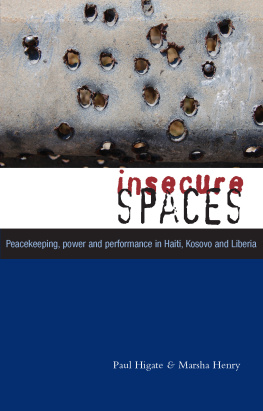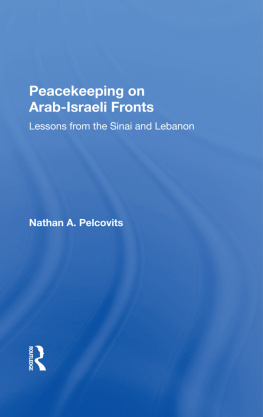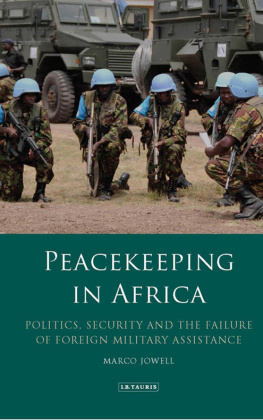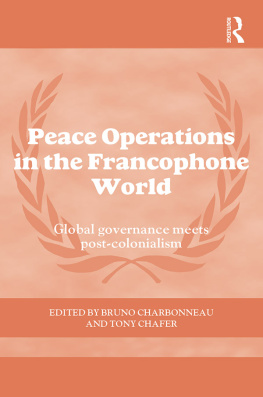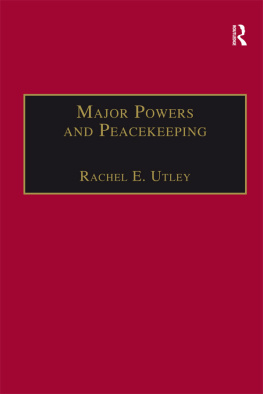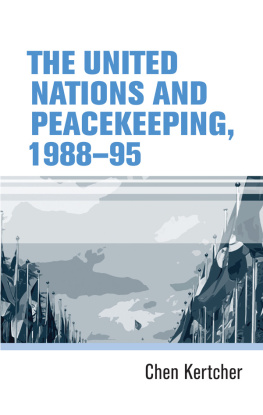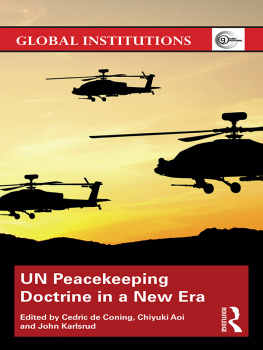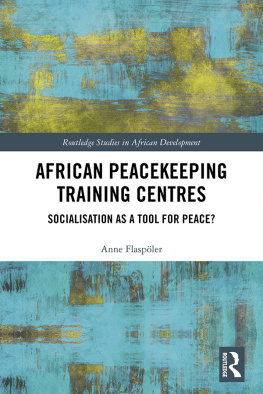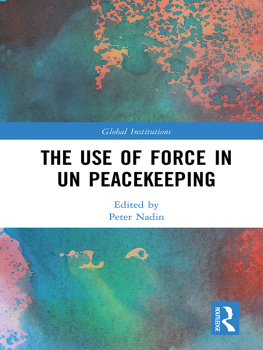Insecure Spaces: Peacekeeping, Power and Performance in Haiti, Kosovo and Liberia was first published in 2009 by Zed Books Ltd, 7 Cynthia Street, London
N1 9JF, UK and Room 400, 175 Fifth Avenue, New York, NY 10010, USA
This ebook edition was first published in 2013
www.zedbooks.co.uk
Copyright Paul Higate & Marsha Henry 2009
The rights of Paul Higate and Marsha Henry to be identified as the authors of this work have been asserted by them in accordance with the Copyright, Designs and Patents Act, 1988
Designed and typeset in Monotype Ehrhardt by illuminati, Grosmont, www.illuminatibooks.co.uk
Index by John Barker
Cover designed by Andrew Corbett
Printed and bound in the UK by the MPG Books Group
Distributed in the USA exclusively by Palgrave Macmillan, at division of St Martins Press, llc, 175 Fifth Avenue, New York, NY 10010, USA
All rights reserved. No part of this publication may be reproduced, stored in a retrieval system or transmitted in any form or by any means, electronic, mechanical, photocopying or otherwise, without the prior permission of Zed Books Ltd.
A catalogue record for this book is available from the British Library
Library of Congress Cataloging in Publication Data available
ISBN: 978-184813-706-6
Acknowledgements
This book owes its existence to the kindness, generosity and encouragement of many people, including those who were frank in revealing their feelings towards peacekeepers and the peacekeeping project. That they did so with humility, patience and dignity to complete strangers is in itself a testament to the human spirit of those living in the challenging conditions of post-conflict societies.
It is impossible to name all of those who helped both directly and indirectly with the fieldwork. In Haiti they include: Nadine, Natalie and all of the UN civilian and military staff who provided transportation, guidance, advice and who often participated as respondents. Numerous womens and gender organizations, most of which wish to remain anonymous, and staff members from international organizations, including Oxfam, MSF and ICRC, gave generously of their time. Many Haitians bravely shared their thoughts, feelings and perceptions on the topic of security, despite their sense of pessimism about the possibility of change in the country. In Kosovo, we thank Habit and family, Michael, Tony, Digi, Tilly, Tamara and all of the UN, OSCE, ICTY and KFOR personnel who gave up much of their time assisting us in our research. Womens organizations in Kosovo also spared time to meet and discuss the much neglected gendered side of post-conflict Kosovo. In Liberia, we thank all of the staff at the Royal Hotel in Monrovia, Sam The Organizer, Jordan, Aine, Sandra, Evariste, Josephine, John and our courageous driver Paul, who shared with us his experiences of living through the many years of civil war in the country. In addition, organizations such as MSF, Norwegian Refugee Council, Oxfam, Save the Children and groups affiliated with a number of churches enabled us to conduct fieldwork in hard-to-access or neglected spaces and communities.
Excellent research assistance over and above the call of (fieldwork) duty was provided by Gurchathen Sanghera, to whom we also owe a debt for his accomplished input into the critical peacekeeping literature sketched in the Introduction. Others who helped facilitate fieldwork include Jamie Munn, James Korovilas, Mimi Sheller and Jean Pret-love. More broadly, our ongoing support from and conversations with Cynthia Enloe, Cynthia Cockburn, Ruth Jacobson, Carol Cohn, Deborah Heifetz-Yahar, Nada Ghandour-Demiri, Christina Rowley, Laura Shepherd, Suruchi Thapar-Bjorkert, Stuart Croft, Anthony Forster, Neil Cooper, Paul Williams, Mark Duffield, Tim Edmunds, Michael Pugh, Martin Gainsborough, Elke Krahmann, Richard Little, Eric Herring, Jutta Weldes, Tony King, Victoria Basham, Rachel Woodward, Tom Slater and Nadine Puechguirbal have shaped our thinking in the pages that follow, though of course we take full responsibility for what has ended up on the page.
The project on which this book is based was made possible with the support of the Economic and Social Research Council. Their award provided for the numerous field visits as well as participation in conferences and workshops throughout many locations around the world. The ideas in this book evolved through academic engagement at many of these events. Administrative support was generously provided by the School for Policy Studies and the Department of Politics, University of Bristol. Colleagues from PRIO, Utrecht University, the Netherlands Defence Academy, and the University of West of England commented on earlier ideas and concepts that shaped the book. To all, a big thank you.
Finally, this book would not have been possible without the support of family, friends and colleagues. Many worried for our safety and sent supportive emails and debriefed with us on our arrival home. In particular, we acknowledge Katinka, Mo, Anya and Frankie, alongside Jonathan, Theo and Audrey. We dedicate the book to you, who, more than likely, know the contents better than we.

